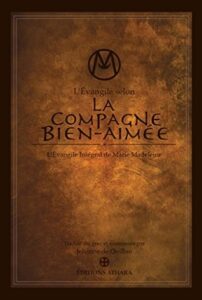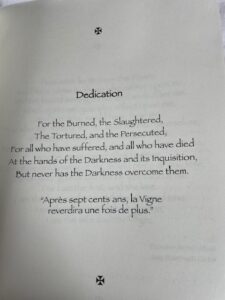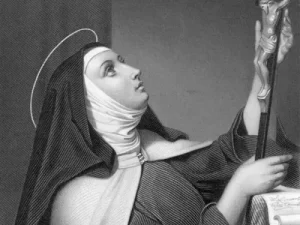Easter
🌷Practicing resurrection.
April 17, 2022“A rabbi friend taught this prayer to me many years ago. The Jews did not speak God’s name, but breathed it:
Inhale=Yah
Exhale=Weh
“God’s name was the first and last word to pass their lips. By your very breathing, you are praying and participating in God’s grace. You are whoo are are, living God’s presence, in the simplify and persistence of breath.
God creates things that continue to create themselves.”
-Fr Richard Rohr, Center for Action & Contemplation
What Did Easter Mean to Early Quakers?
Quakers insisted that the spirit of Christ that was experienced by Jesus’s disciples after the resurrection, by Paul on the road to Damascus, and in gatherings of the early Church, is universally available to everyone in all ages, locations, and cultures.
For early Quakers, Christ was not tied just to Jesus, but, as with the Word in the Gospel of John [Gospel of Mary Magdalene-dayle], was present from the beginning and is manifest in the prophets of Judaism and other religious traditions. One might say today it does not matter if the resurrection of Jesus was physical or spiritual, for, from the beginning, Quakers have insisted that Christ’s spirit can be experienced by any of us anywhere. Hence Mary Fisher, one of Quakerism’s founding Valiant Sixty, felt confident she could minister to the Sultan of Turkey, because he would know the same universal spirit of God or Christ that she did.
Let us then think of the risen Christ [consciousness] as a transforming experience of the Divine that is available on any day of the year without regard to religion or theology.
[The Beloved Companion/The Complete Gospel of Mary Magdalene,
by Jehanne de Quillan]
The Gospel of Mary
In our present age, we stand at a crossroads in our history. No one can deny, as well at our world today, that all about us we see turmoil and suffering, war and economic exploitation, corruption and greed; while torture, rape, and murder have become politically justifiable weapons of war. In our clearest moments, we must recognize that these are the first signs of the collapse of our social and economic forms and institutions. Perhaps, in the midst of this seemingly endless change of chaotic events, we need to look very closely at the value sand beliefs that have brought us to this place. For only be amning our past can we come to understand our present, and perhaps, by learning from our mistakes, begin to change our future.
Pink Moon
ღ
‘Focus on the feminine aspects of beauty, forgiveness, compassion and healing.’
-Power Path
‘All shall be well, and all manner of things shall be well.’
-Julian of Norwich
‘History is set on an inherently positive and hopeful tangent.’
-Fr Richard Rohr
R
I
L
K
E
‘Ever again, though we’ve learned the landscape of love
and the lament in the churchyards names
and the terrible, silent abs where the others have fallen;
ever again we walk out, two together,
under the ancient trees, ever again find a place
among wildflowers, under heaven’s gaze.’
The origin of the order can be traced to Mount Carmel in northwestern Israel, where a number of devout men, apparently former pilgrims and Crusaders, established themselves near the traditional fountain of Elijah about 1155; they lived in separate cells or huts and observed vows of silence, seclusion, abstinence, and austerity. Soon, however, the losses of the Crusading armies in Palestine made Mount Carmel unsafe for the Western hermits, and around 1240 they set out for Cyprus, Sicily, France, and England. [Britannica]
Carmelite philosopher Edith Stein:
“I do not exist of myself, and of myself I am nothing. Every moment I stand before nothingness, so that every moment I must be dowered anew with being … This nothing being of mine, this frail received being, is being … It thirsts not only for endless continuation of its being but for full session of being.”
St. Teresa of Ávila
Of all the movements in the Carmelite order, by far the most important and far-reaching in its results was the reform initiated by St. Teresa of Ávila. [Britannica]
Ileo Delio:
“For Stein, the very existence of ‘I’ means the ‘I’ is not alone; the ‘I’ experiences loneliness only when it becomes unconscious of its very existence.”
French philosopher and mystic Simone Weil:
“Whoever says ‘I’ lies.”
[The Unbearable Wholeness of Being, p. 61.]
A final thought in memory of my late sweet friend Marilyn Andrews:
“How do we give thanks and give back to other earth — G A I A ❀ — and the cosmos and all the blessings our species has inherited?”
Rabbi Abraham Heschel teaches that a prophets primary task is to interfere.
Julian of Norwich, by calling us to interfere with patriarchy and heal the wounds that it has wracked upon human history and the human soul and the earth, beckons us from folly to wisdom. Are we listening?” -Matthew Fox
Are we practicing resurrection? -dayle
Redeeming ℒℴve through the feminine.
April 3, 2021[Image: Thomas Merton]
Cynthia Bourgeault:
“Mary Magdalene belongs to the great worldwide stream of spiritual awakening and has nothing whatsoever to do with organized religion.
If we are serious about activating Mary Magdalene’s wisdom presence within contemporary Christianity, the first step is to increase her visibility within the liturgy, particularly during Holy Week, where her presence is so crucial to understanding the Paschal Mystery as an act of redeeming ℒℴve.
I would like to see the entire Holy Week liturgy reframed around two parallel anointings…at Bethany and in the garden of the resurrection…which so powerfully convey the energy of transformative love.
Early Easter morning ceremonially enacted, rather than merely read, the gospel account of Mary Magdalene’s visit to the tomb. The basic ceremony, the Visitatio Sepulchri, has been around since the tenth century; it merely needs to be returned to active duty.
Mary Magdalene weaves into one whole cloth those strands that have traditionally been kept so stringently separated: conscious ℒℴve, healing, kenotic surrender, the feminine, singleness, transformation. To touch any part of the this hologram is to invoke all the rest.
We do not know for certain what happened to Mary Magdalene after the resurrection. The gospel bearing her name confirms that her spiritual leadership was honored in a least some circles of early Christianity. She may well have sojourned in France. What we do know for certain is that the fragrance of her presence did not disappear from Christianity. In mysticism and allegory, in art and folklore, in esoteric circles…all veiled, but pointing like a finger at the moon…her mysterious alchemical feminine was kept alive. Now at last, in our own times, it comes above ground again, asking us to awaken yet again to the morning of the resurrection and find ourselves in the garden, awaiting the encounter that can change our institutional hearts.
The imaginal realm is real, and through it you will never be separated from any one or anything you have ever loved, for ℒℴve is the ground in which you live and and move and have your being. This is the message that Mary Magdalene has perennially to bring. This is the message we most need to hear.”
‘In 591 Pope Gregory claimed that Mary of Magdala was a prostitute, a misconception that remains to this day. In 2016 she was named by the Vatican as the apostle of the apostles, their equal.’
-Written by Helen Edmundson and Philippa Goslett. Directed by Garth Davis.
https://www.rogerebert.com/reviews/mary-magdalene-2019
“As someone who watched it twice in 24 hours, ‘Mary Magdalene’ moved me in a way that no previous film about Christianity ever has.
Mary finds a place in the world and a cause in which to place her profound empathy. She was not just any spectator, this telling argues, so much as proof that at the core of Jesus’ teachings is a feminine influence.” -Nick Allen
An Easter Meditation
April 12, 2020‘…resist empire with truth and love, even if it kills you.’
-Pádraig Ó Tuama, poet, theologian and mediator.
[OnBeing.org]
Principles for a Pandemic
by Sister Joan chittister
“Rules are not necessarily sacred,” Franklin Delano Roosevelt said, “principles are.”
One thing is clear: “Rules” are not getting us out of the largest pandemic in modern history.
We’re washing our hands and wearing our masks and staying indoors and counting the number of people in every group, but the numbers keep going up regardless.
At the same time, principles, if any, may be necessary but nobody talks about them much —despite the fact that it’s principles that guide our behavior or help us to evaluate what’s going on around us. Principles are the motivating force upon which everything we do is based.
The question is what kind of basic truths — principles — must drive us if we are to endure and survive the kind of despair that threatens a national moment like this one? Here we are at the touchdown point of a tornado called a pandemic. Everything about life before this has been wiped away. Worse, we have not a hint of what our world will look like in the future. Unless we define the principles we need to preserve, not only to get us through this moment but to prepare for all the great moments in times to come, this will all have been for nothing.
Becoming a spiritual person is what raises us above the angst of life. We can lose anything, let anything go, begin again after whatever tornado shreds us if we only learn to live with one part of the human heart daily invested in the presence of the divine. In that sacred space within, we seek the strength it takes to respond rightly to the pressure of such pain. We are not pleading for magic from a vending machine God to save us from its inconvenience.
We take on the challenges of the community — the masks and distancing and overtime work that’s needed — as if they were our personal responsibility alone. We check on those who are frail, who need to know they’re not alone, who are seeking services. We allow no one to be out of contact. We volunteer where we’re needed.
The principles of the holy life are obvious: it begins with a sterling spirituality, an abounding love of community and an incessant sense of personal responsibility that makes the undoable, doable always.
Until finally, it depends on following leadership that glows with goodness and vision. It is the leadership that shows us all how to be more empathic, more aware of the needs of others, more present to the demands of it all. It is the living vision of moral leadership that sends us back into the wind as long as it rages. It brings us to a greatness no circumstances can exhaust, no storm can conquer.
From where I stand, it’s not about the rules. It’s about the heart. Then we can go on, and go on, and go on. For over 1,500 years. Same rule, same principles, same gratuitous generosity of life.
A woman wearing a protective mask due to the coronavirus pandemic prays inside the Church of the Sacred Heart of Jesus on Palm Sunday, April 5 in Turin, Italy. (CNS/Reuters/Massimo Pinca)
https://www.ncronline.org/news/opinion/where-i-stand/principles-pandemic
From Journalist Bill Moyers:
‘During these trying days of social distancing, self-isolating and quarantines, days rife with fear and anxiety, my colleagues and I thought you might like some company. So each day we will be introducing you to poets we have met over the years. The only contagion they will expose you to is a measure of joy, reflection and meditation brought on by “the best words in the best order.” Enjoy.’
Today we hear from Wendell Berry as he reads “A Poem on Hope.”
“A Poem on Hope”
It is hard to have hope. It is harder as you grow old,
For hope must not depend on feeling good
And there is the dream of loneliness at absolute midnight.
You also have withdrawn belief in the present reality
Of the future, which surely will surprise us,
…And hope is harder when it cannot come by prediction
Any more than by wishing. But stop dithering.
The young ask the old to hope. What will you tell them?
Tell them at least what you say to yourself.
Because we have not made our lives to fit
Our places, the forests are ruined, the fields eroded,
The streams polluted, the mountains overturned. Hope
Then to belong to your place by your own knowledge
Of what it is that no other place is, and by
Your caring for it as you care for no other place, this
Place that you belong to though it is not yours,
For it was from the beginning and will be to the end
Belong to your place by knowledge of the others who are
Your neighbors in it: the old man, sick and poor,
Who comes like a heron to fish in the creek,
And the fish in the creek, and the heron who manlike
Fishes for the fish in the creek, and the birds who sing
In the trees in the silence of the fisherman
And the heron, and the trees that keep the land
They stand upon as we too must keep it, or die.
This knowledge cannot be taken from you by power
Or by wealth. It will stop your ears to the powerful
when they ask for your faith, and to the wealthy
when they ask for your land and your work.
Answer with knowledge of the others who are here
And how to be here with them. By this knowledge
Make the sense you need to make. By it stand
In the dignity of good sense, whatever may follow.
Speak to your fellow humans as your place
Has taught you to speak, as it has spoken to you.
Speak its dialect as your old compatriots spoke it
Before they had heard a radio. Speak
Publicly what cannot be taught or learned in public.
Listen privately, silently to the voices that rise up
From the pages of books and from your own heart.
Be still and listen to the voices that belong
To the streambanks and the trees and the open fields.
There are songs and sayings that belong to this place,
By which it speaks for itself and no other.
Found your hope, then, on the ground under your feet.
Your hope of Heaven, let it rest on the ground
Underfoot. Be it lighted by the light that falls
Freely upon it after the darkness of the nights
And the darkness of our ignorance and madness.
Let it be lighted also by the light that is within you,
Which is the light of imagination. By it you see
The likeness of people in other places to yourself
In your place. It lights invariably the need for care
Toward other people, other creatures, in other places
As you would ask them for care toward your place and you.
No place at last is better than the world. The world
Is no better than its places. Its places at last
Are no better than their people while their people
Continue in them. When the people make
Dark the light within them, the world darkens.
Wendell Berry is a man of the land and one of America’s most influential writers, whose prolific career includes more than forty books of poetry, novels, short stories and essays. Watch Bill’s full conversation with Wendell Berry.
Wendell Berry, a quiet and humble man, has become an outspoken advocate for revolution. He urges immediate action as he mourns how America has turned its back on the land and rejected Jeffersonian principles of respect for the environment and sustainable agriculture. Berry warns, “People who own the world outright for profit will have to be stopped; by influence, by power, by us.” In a rare television interview, this visionary, author, and farmer discusses a sensible, but no-compromise plan to save the Earth.






